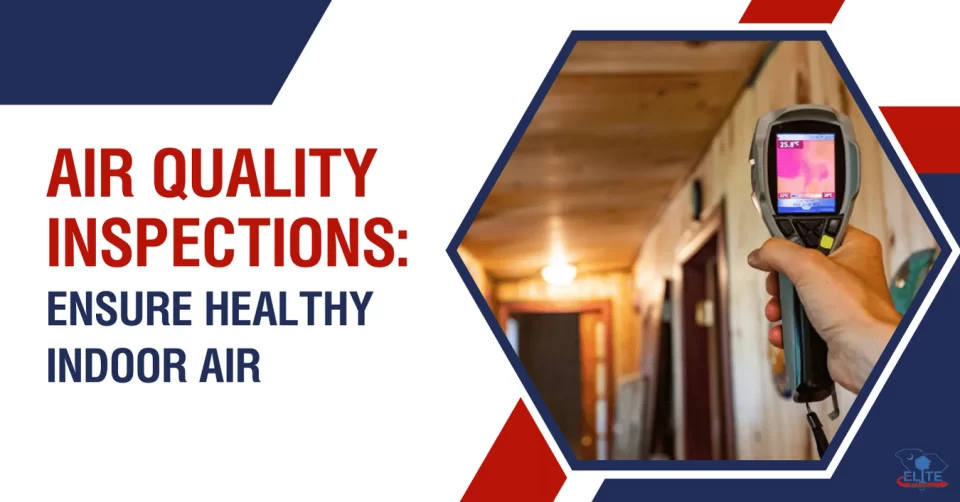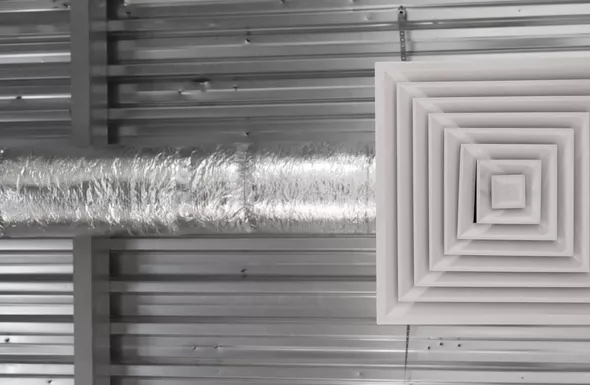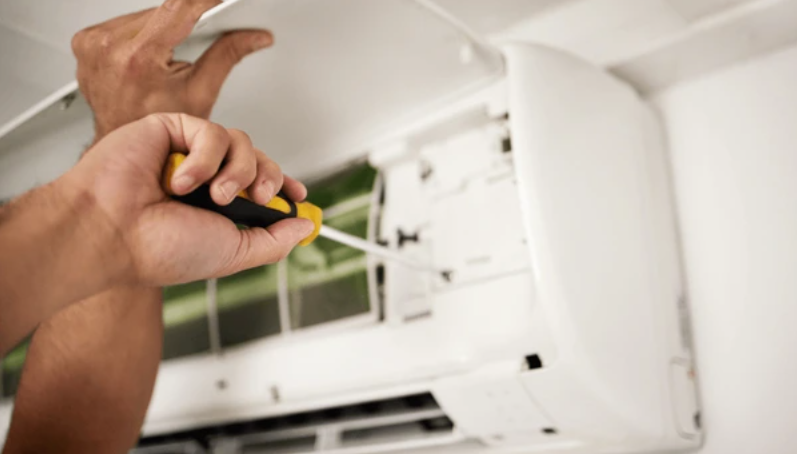When most homeowners think about improving their indoor air quality, they probably envision air purifiers, ventilation systems, or better cleaning habits. However, there’s one important factor that often gets overlooked: your heating system. Yes, the system that keeps you warm during those chilly winter months plays a huge role in the quality of the air you breathe.
In fact, your heating system directly impacts everything from air circulation and filtration to humidity control. It can either help maintain clean, healthy air or contribute to a buildup of allergens, dust, and even harmful gases.
How Does Heating Service Affect Indoor Air Quality?
It might not be immediately obvious, but your heating system is closely tied to the air quality in your home. Central heating systems, for example, use air ducts to distribute warm air throughout your house.
If those ducts aren’t properly cleaned and maintained, they can spread dust, mold, and other contaminants, lowering the air quality in your home. Here’s a breakdown of how heating services can impact your air:
1. Air Circulation
The air ducts in your heating system play a crucial role in moving warm air from room to room. If those ducts are clogged with dust, debris, or even mold, your heating system will end up circulating those harmful particles throughout your home.
The solution? Regular heating maintenance. During service visits, HVAC professionals clean and inspect your ducts to ensure that clean air is flowing through your home, not dust and allergens.
2. Filtration Efficiency
Your heating system relies on filters to trap dust, dirt, and other particles before the air enters your living spaces. But over time, these filters can get clogged with all the debris they’ve collected, rendering them less effective. Regular heating services make sure that your filters are cleaned or replaced as needed, which helps maintain proper airflow and ensures that harmful particles like dust, pollen, pet dander, and bacteria are effectively filtered out.
3. Humidity Control
Heating systems—especially forced-air systems—can significantly lower indoor humidity levels, making the air dry and uncomfortable. This can lead to dry skin, irritated sinuses, and even exacerbate respiratory conditions like asthma or allergies.
A properly maintained heating system will help regulate humidity levels in your home. Plus, many services include installing or checking a humidifier to add moisture to the air, promoting a more comfortable and healthier indoor environment.
4. Carbon Monoxide and Gas Leaks
For homeowners with gas-powered heating systems, one of the biggest risks is carbon monoxide, a colorless and odorless gas that can be deadly in high concentrations. Regular maintenance checks can prevent dangerous gas leaks, ensuring that your heating system operates safely and efficiently.
HVAC professionals will check for leaks, verify the combustion process, and make sure that your system’s safety mechanisms are functioning properly to keep your home air safe.
Can Heating Systems Improve Air Quality in a Home?
It’s not just about preventing bad air quality; your heating system, when properly maintained, can actually improve the air you breathe. How? Let’s take a look at a few ways that modern heating systems can enhance indoor air quality:
1. Advanced Filtration Systems
If your heating system uses high-efficiency filters like HEPA (High-Efficiency Particulate Air) filters, it’s already doing a better job of cleaning the air than traditional filters. HEPA filters can trap even the smallest particles, such as pollen, pet dander, bacteria, and even some viruses.
Scheduling regular service helps ensure that these filters are cleaned or replaced when needed, maximizing their ability to improve your home’s air quality.
2. Air Purification Integration
Some of the latest heating systems come equipped with built-in air purifiers, or they can be easily integrated with external purifiers. These systems help remove airborne contaminants, improve airflow, and reduce allergens.
For example, ultraviolet (UV) light purifiers can be installed within your heating system to kill bacteria, viruses, and other harmful microorganisms. These extra features help take your air quality to the next level.
3. Balanced Airflow
A well-maintained heating system ensures that the airflow throughout your home is balanced. When airflow is optimal, air circulates freely, preventing cold spots or areas with stagnant air, where allergens can accumulate. HVAC professionals adjust your system to ensure that your home is properly ventilated, making sure that air quality is as fresh and clean as possible in every room.
4. Humidity Control Features
Some modern heating systems include built-in humidifiers that can regulate the humidity levels in your home. By adding moisture to the air, these systems help prevent the dry air that can aggravate allergies and asthma.
Maintaining the right humidity levels can make a huge difference in your overall comfort and health, ensuring your home is not only warm but also easy on your respiratory system.
What Role Do Heating Services Play in Preventing Allergens?
For those with allergies, maintaining good indoor air quality is a top priority. If your heating system isn’t properly maintained, it can become a breeding ground for dust, pet dander, mold, and pollen—all of which can trigger allergic reactions. Here’s how heating services can help keep allergens at bay:
1. Cleaning and Sanitizing Ducts
Over time, your ducts can accumulate dust, mold spores, pet dander, and other allergens. When the heating system is turned on, these particles are circulated throughout the house.
Regular heating services include professional duct cleaning, which removes harmful contaminants and ensures that allergens aren’t dispersed into your home. Clean ducts mean cleaner air!
2. Replacing or Upgrading Filters
The filters in your heating system act as the first line of defense against allergens. But over time, filters can get clogged with debris, reducing their ability to trap particles. Heating services ensure that filters are cleaned or replaced regularly, and for allergy sufferers, your technician might recommend upgrading to a high-efficiency particulate air (HEPA) filter for superior protection against airborne allergens.
3. Preventing Mold Growth
Mold is one of the most harmful allergens in homes, and it thrives in moist environments. If there are leaks or moisture buildup in your heating system or ducts, mold can easily take hold.
Regular heating maintenance checks for signs of moisture or mold growth, allowing you to address potential issues before they become bigger problems. Keeping mold out of your system helps reduce the risk of respiratory issues and allergy flare-ups.
4. Maintaining Consistent Air Circulation
Heating services ensure that your system’s airflow is consistent, helping to prevent the buildup of stagnant air. Stale air can trap allergens, which is particularly problematic in areas of your home that don’t get much ventilation. By maintaining steady circulation, heating services help ensure that allergens don’t accumulate in one place and are spread evenly throughout the home.
How Often Should Heating Services Be Performed to Maintain Air Quality?
To keep your home’s air quality at its best, regular maintenance is essential. But how often should you schedule heating services to make sure your system is running efficiently and your air stays clean? Here’s a quick breakdown:
1. Annual Inspection
The most important service you can schedule is an annual inspection. During this visit, an HVAC technician will check the entire system, clean components, inspect ducts, replace filters, and ensure your heating system is operating efficiently. Regular inspections ensure that your system is functioning optimally and that your indoor air quality remains top-notch.
2. Filter Replacement Every 3-6 Months
While an annual inspection is crucial, filter replacement should be done more frequently—typically every 3 to 6 months. If you live in a high-pollen area, have pets, or suffer from allergies, you may need to replace filters even more often. A clogged filter will restrict airflow and reduce your system’s ability to improve air quality.
3. Duct Cleaning Every 3-5 Years
Duct cleaning should be done every 3 to 5 years, depending on the amount of dust and debris in your system. If you notice an increase in dust around vents or experience worsening allergy symptoms, it may be time for a duct cleaning.
4. Moisture and Mold Checks
If you live in a humid area or have had leaks in the past, it’s important to regularly check for moisture and mold growth in your heating system. Mold can trigger allergic reactions and cause health issues, so catching it early is key.
5. Humidifier Maintenance (If Applicable)
If your heating system includes a built-in humidifier, it should be cleaned regularly—about every 1 to 3 months. This prevents bacteria and mold from growing in the humidifier, ensuring that it continues to add clean moisture to the air.
Breathe Easy With Proper Heating Maintenance
Your heating system does more than just keep your home warm; it plays a crucial role in maintaining good indoor air quality. Regular heating services are essential to preventing allergens, improving filtration efficiency, and ensuring optimal air circulation and humidity. By staying on top of heating maintenance, you’re not just boosting comfort, you’re also making sure the air you breathe is fresh, clean, and healthy.
If you’re ready to improve your indoor air quality and ensure your heating system is running efficiently, don’t wait—schedule your heating service today. Let’s keep your home as comfortable and healthy as possible!
Contact Elite Air & Heat LLC today!
At Elite Air & Heat LLC, we specialize in heating services that improve indoor air quality. Our expert technicians provide maintenance, repairs, and installations to ensure that your HVAC system keeps your home comfortable and your air fresh.
Call us now to experience the difference we can make for your home’s air quality!



